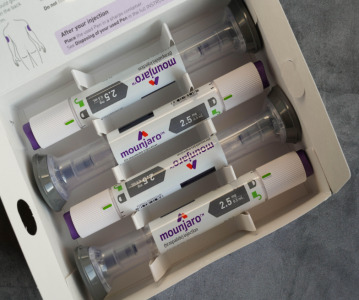FDA approves Merck’s Keytruda for patients with recurrent or metastatic HNSCC

New treatment option for patients with with disease progression on or after platinum-containing chemotherapy.
Merck (MSD)has announced that the FDA has approved Keytruda (pembrolizumab), the company’s anti-PD-1 (programmed death receptor-1) therapy, at a fixed dose of 200 mg every 3 weeks, for the treatment of patients with recurrent or metastatic head and neck squamous cell carcinoma (HNSCC) with disease progression on or after platinum-containing chemotherapy. Under the FDA’s accelerated approval regulations, this indication for Keytruda is approved based on tumour response rate and durability of response. Continued approval for this indication may be contingent upon verification and description of clinical benefit in the confirmatory trials. For HNSCC patients, PD-L1 testing is not needed prior to use of Keytruda.
The approval is based on data from the KEYNOTE-012 study, which included patients with recurrent or metastatic HNSCC who had disease progression on or after platinum-containing chemotherapy or following platinum-containing chemotherapy administered as part of induction, concurrent, or adjuvant therapy and ECOG performance status (PS) of zero or one. The data showed an objective response rate (ORR) of 16%, complete response rate of 5%, with responses of 6 months or longer observed in 82% of the responding patients. ORR and duration of response were similar regardless of human papilloma virus (HPV) status.
“Today’s approval represents a meaningful advance for the oncology community, as well as for our head and neck cancer clinical program,” said Dr Roger M. Perlmutter, president, Merck Research Laboratories. “Together with prior approvals in the treatment of other tumour types, today’s action by the FDA underscores our tireless commitment to addressing the unmet needs of patients suffering from a broad range of cancers.”
KEYNOTE-012 was the first clinical study to investigate the role of a PD-1 inhibitor in patients with recurrent or metastatic HNSCC with disease progression on or after platinum-containing chemotherapy. Merck currently has the largest immuno-oncology clinical development program, including multiple registration-enabling studies in head and neck cancer, and is conducting research investigating Keytruda (pembrolizumab) as a monotherapy, as well as in combination with chemotherapy compared to the current standard of care.
“Head and neck cancer is a complex disease that historically has been associated with high recurrence rates and poor long-term outcomes, highlighting the critical need for new treatment options,” said Dr Tanguy Seiwert, associate director of the Head and Neck Cancer Program and assistant professor of medicine at The University of Chicago. “The approval of Keytruda for previously treated patients with recurrent or metastatic HNSCC is an important step forward in treating this disease.”
Keytruda is a humanized monoclonal antibody that works by increasing the ability of the body’s immune system to help detect and fight tumour cells. Keytruda blocks the interaction between PD-1 and its ligands, PD-L1 and PD-L2, thereby activating T lymphocytes which may affect both tumour cells and healthy cells.
“HNSCC presents unique challenges including limited treatment options, especially for patients with recurrent or metastatic disease,” said Holly Boykin, executive director, Head and Neck Cancer Alliance. “We welcome the approval of Keytruda as a new treatment option for people whose lives are affected by this devastating disease.”
Related News
-
News The next 15 drugs up for negotiation with Medicare include several blockbusters
By now, everyone is quite familiar with the drug price negotiations taking place between drug companies and the Centres for Medicare & Medicaid Services (CMS) in the USA as part of measures being taken to reduce the cost of drugs for patients, to make ... -
News PSCI Welcomes Delpharm, Samsung Biologics, and Suven as First Supplier Partners
The pharmaceutical industry continues to evolve with an increasing focus on responsible sourcing, sustainability, and collaboration across the supply chain. Under a new model to recognise suppliers within the pharmaceutical and healthcare industry that... -
News Drug prices agreed upon as part of the US Inflation Reduction Act
The Inflation Reduction Act brought into constitution by the Biden administation in 2022, which proposed a drug price negotiation between the government and pharmaceutical companies, has reached it's first agreement. -
News Eisai Alzheimer’s drug authorised in UK but still faces obstacles
In partnership with BioArctic AB, pharmaceutical company Eisai has been granted Marketing Authorisation by the Medicines and Healthcare products Regulatory Agency (MHRA) for its Alzheimer’s disease drug product Leqembi. -
News Eli Lilly's weight loss drugs removed from the FDA's shortage list
The US FDA have recently updated their drug shortage list. The recently released list shows that all dosage forms of Eli Lilly's weight-loss drug Zepbound and their diabetes drug Mounjaro are now available. -
News Global advancements in the diagnosis and treatment of rare diseases: Rare Disease Day 2024
Rare Diseases Day is celebrated on the 29th February 2024 and represents the plight of rare disease patients to gain diagnosis and access to suitable treatment. -
News Pharmaceutical industry supports COP28 health stance in joint statement
As COP28 takes place over this week in Dubai, UAE, several bodies in the pharmaceutical and health industries have come together to announce support of key movements in sustainability in the sector, and to recognise sustainability as a health issue.&nb... -
News Biden backs Cold-War measures to shore-up medical supply chains
In a recent strategy to combat rising inflation and the cost of living crisis, President Joe Biden has invoked a Cold War-era act to increase investment in a selection of medicines and supplies.
Recently Visited
Position your company at the heart of the global Pharma industry with a CPHI Online membership
-
Your products and solutions visible to thousands of visitors within the largest Pharma marketplace
-
Generate high-quality, engaged leads for your business, all year round
-
Promote your business as the industry’s thought-leader by hosting your reports, brochures and videos within your profile
-
Your company’s profile boosted at all participating CPHI events
-
An easy-to-use platform with a detailed dashboard showing your leads and performance



.png)



